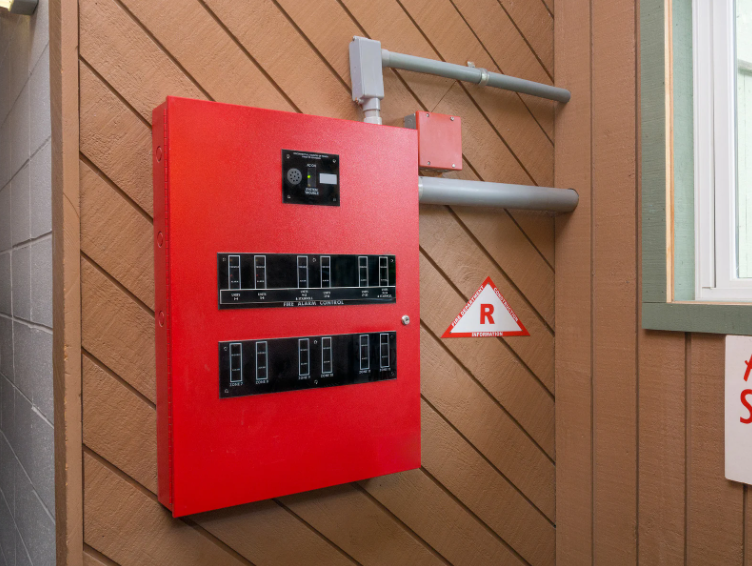Fire safety is a critical concern for residential, commercial, and industrial properties. A well-designed fire protection system can mean the difference between minimal damage and a catastrophic loss. A fire alarm panel plays a central role in fire detection and response by serving as the command center for the entire fire protection system. With a fire alarm panel, building owners and safety personnel can monitor potential fire hazards, trigger alerts, and coordinate emergency responses efficiently.
What Is a Fire Alarm Panel?
A fire alarm panel is an essential component of any fire detection system. It functions as the central hub that receives signals from fire detection devices such as smoke detectors, heat sensors, and sprinkler systems. When a fire alarm panel detects potential fire hazards, it activates alarms, notifies emergency responders, and can even initiate automated fire suppression measures. Fire alarm panels come in different types, each designed to accommodate various building layouts and fire protection needs.
How Fire Alarm Panels Work
A fire alarm panel operates through a structured process to ensure immediate response in case of a fire emergency. Fire detection devices, such as smoke detectors and heat sensors, continuously monitor their environment and send signals to the fire alarm panel when a potential fire is detected. The fire alarm panel processes these signals and determines the appropriate response, whether it be activating alarms, notifying fire departments, or initiating sprinkler systems. Modern fire alarm panels are designed to provide real-time monitoring, ensuring rapid action against fire hazards.
Types of Fire Alarm Panels
Conventional Fire Alarm Panels
A conventional fire alarm panel divides a building into multiple zones, each connected to a group of detection devices. When an alarm is triggered, the fire alarm panel identifies the affected zone but does not pinpoint the exact location of the fire. These panels are ideal for small to medium-sized buildings that do not require precise fire location tracking.
Addressable Fire Alarm Panels
An addressable fire alarm panel provides a more advanced approach by assigning a unique address to each detection device. When an alarm is activated, the fire alarm panel identifies the exact location of the fire, allowing for faster and more targeted emergency responses. Addressable fire alarm panels are widely used in large commercial buildings, hospitals, and industrial facilities.
Hybrid Fire Alarm Panels
A hybrid fire alarm panel combines features of both conventional and addressable systems. It offers flexibility in installations where a mix of different fire detection technologies is required. This type of fire alarm panel is beneficial for complex structures that need both zone-based and pinpointed fire detection capabilities.
Key Features of Modern Fire Alarm Panels
Modern fire alarm panels come equipped with advanced features that enhance fire safety and response efficiency. These features include:
- Real-time monitoring: A fire alarm panel continuously tracks the status of connected devices.
- Smart building integration: Some fire alarm panels can integrate with smart building systems for automated responses.
- Battery backup: Ensures functionality during power outages.
- Remote access: Some fire alarm panels allow monitoring and control via mobile applications.
- Compliance with safety regulations: Ensures adherence to fire safety codes and legal requirements.
Benefits of Using a Fire Alarm Panel for Comprehensive Fire Protection
A fire alarm panel provides numerous benefits, making it an essential component of any fire safety strategy. By using a fire alarm panel, building owners can detect fires early, reducing the risk of property damage and loss of life. The centralized control offered by a fire alarm panel ensures that all fire detection and suppression systems work in sync. Additionally, a fire alarm panel simplifies maintenance and monitoring by providing a single point of control for fire safety devices.
Choosing the Right Fire Alarm Panel for Your Needs
Selecting the right fire alarm panel depends on several factors, including building size, occupancy type, and fire safety regulations. A fire alarm panel should be chosen based on its ability to meet the specific fire protection requirements of the facility. Additionally, it is important to compare different brands and technologies to find a fire alarm panel that offers reliability, ease of use, and scalability. Professional installation and regular maintenance further ensure that a fire alarm panel functions effectively in the long run.
Common Issues and Troubleshooting Fire Alarm Panels
Despite their reliability, fire alarm panels can sometimes experience issues that require troubleshooting. Common problems include false alarms, sensor malfunctions, and system errors. False alarms can be caused by dust accumulation in smoke detectors or environmental factors triggering heat sensors. Regular maintenance, including sensor cleaning and system checks, helps prevent these issues. A fire alarm panel should also undergo routine inspections to identify potential faults before they become serious problems.
Fire Alarm Panel Maintenance and Compliance
Regular maintenance is essential to keep a fire alarm panel in optimal condition. Fire safety regulations often require scheduled inspections and testing to ensure compliance. A fire alarm panel must be checked for faulty connections, power supply issues, and detector sensitivity to maintain its effectiveness. Following manufacturer guidelines and industry standards ensures that a fire alarm panel continues to provide reliable fire protection.
Future Trends in Fire Alarm Panel Technology
The fire protection industry continues to evolve, with emerging technologies enhancing fire alarm panel capabilities. Some of the latest trends include:
- AI-driven fire detection: Fire alarm panels equipped with artificial intelligence can analyze patterns and detect fires more accurately.
- IoT integration: A fire alarm panel connected to the Internet of Things (IoT) allows for real-time monitoring and remote alerts.
- Wireless fire alarm systems: Wireless fire alarm panels provide flexibility in installation, reducing the need for extensive wiring.
Takeaway
A fire alarm panel is an indispensable tool for comprehensive fire protection. By providing centralized control, real-time monitoring, and automated responses, a fire alarm panel enhances safety and minimizes fire-related risks. Choosing the right fire alarm panel, ensuring regular maintenance, and staying updated with the latest fire protection technologies can significantly improve fire safety in any building. Investing in a reliable fire alarm panel today can prevent disasters and save lives in the future.







